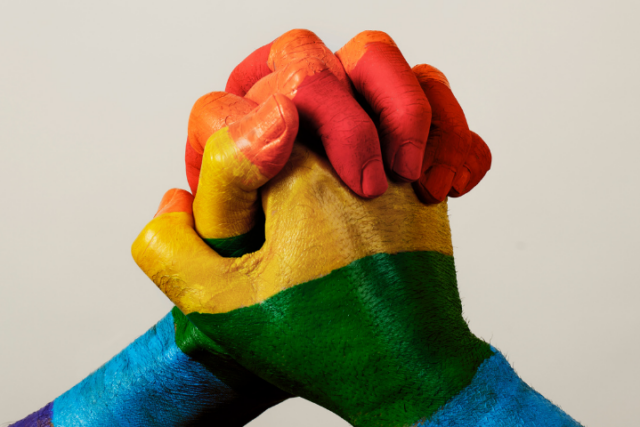
Chaired by Kaitlyn Burns, Esq., the LGBTQ+ Rights Committee works to end discrimination against LGBTQ+ Pennsylvanians in our courts and throughout the Commonwealth.
Committee Feature
In its Final Report, the Pennsylvania Supreme Court Committee on Racial and Gender Bias in the Justice System study noted “concerns regarding bias against . . . gay, lesbian, bisexual, and [transgender] individuals” and suggested that government officials “consider . . . addressing the needs of these groups, in light of the similarity of issues and solutions in the context of race, ethnicity, and gender.”
To address these needs, the LGBTQ+ Rights Committee has met with legislators and submitted letters in support of legislation designed to secure non-discrimination protections for LGBTQ+ individuals that are currently afforded to other Pennsylvanians. This legislation, entitled the “Fairness Act,” would amend the Pennsylvania Human Relations Act (“PHRA”) to prevent individuals from being denied access to housing, employment, or public accommodations based on their sexual orientation or gender identity.
For the first time in its 22-year history of being introduced, the Fairness Act passed the Pennsylvania House of Representatives in the 2023-24 legislative term, receiving bipartisan support. Because the bill did not pass the Senate, the Committee is coordinating with legislators and stakeholders across the Commonwealth to secure the needed support. In the meantime, the Committee continues to advocate for similar non-discrimination protections at the local level. In July 2024, the Committee worked with other LGBTQ+ organizations to host a statewide webinar on the importance of localized ordinances. The Committee is exploring additional, related programming for 2025.
The Committee’s current initiatives include the following:
- Monitoring the proposal of the PA Supreme Court’s Civil Procedural Rules Committee to adopt a statewide rule governing name change petitions in PA, on which the Committee submitted comments in 2024, and formulating strategies to advocate for bills designed to simplify the name change process that, despite the Committee’s support, did not pass in 2024.
- Supporting legislation designed to prevent discriminatory practices of private schools receiving taxpayer-funded voucher dollars.
- Partnering with allied professionals and experts to secure non-discrimination protections for LGBTQ+ youth in the foster care system and draft model guidance to be shared with stakeholders across the Commonwealth.
- Exploring advocacy-oriented webinars on local non-discrimination ordinances and a partnership with the Pennsylvania Human Relations Commission (“PHRC”) to administer programming on the PHRA.
Members
- Kaitlyn Burns, Esq. (Chair)
- Heather Batzel, Esq.
- Morgan Bonekovic, Esq.
- Amanda Bonnet
- Lee Carpenter, Esq.
- Corinne Goodwin
- Hon. Kathryn Mary Hens-Greco
- Nafisah Houston, MS
- Sara Jacobson, Esq.
- Hon. Lisa Lenihan (Ret.)
- Kelly Lynch
- Donald MacLeod, MSW
- Michael Roche, Esq.
- Gerri Sperling, Esq.
- Hon. Victor P. Stabile
Reports
- Press Release: PCFJ Celebrates Supreme Court Decision Affirming Parentage by Intent
- Comments to Court re Proposed Statewide Name Change Rule
- Letter in Support of Bill Standardizing and Improving Equal Access to Legal Parentage Determinations in PA
- Amicus Brief in Support of Intent-Based Parentage for Children Conceived Through Assistive Reproductive Technology (“ART”)
- Letter in Support of Three State Bills Modernizing Name Change Process
- Letter in Support of HB 575, Protecting Minors in PA from Conversion Therapy
- Letter in Support of SB 63, Combating Hate-Based Violence Against LGBTQ+ People
- Letter in Support of SB 326, Data for LGBTQ+ Lives Act
- Letter in Support of HB 300, Expanding Non-Discrimination Protections for LGBTQ+ People
- Letter Urging HHS to Reverse Trump-Era Decision to Not Enforce Existing Non-Discrimination Protections
- Letter in Support of SB 854, Prohibiting Use of LGBTQ “Panic” Defense in PA
- PBA Article – Pushing Forward: The Need for State-Based Protections Post-Bostock
- Letter in Support of HB 300, Expanding Non-Discrimination Protections for LGBTQ Individuals
- Comments re HUD’s Proposed Rule, Homeless Shelters & Facilities
- Comments in Opposition to Proposed Rule Permitting HHS Grant Recipients to Deny Services to LGBTQ+ Individuals
- Comments on Proposed Amendments to PA Orphans’ Court Rules
